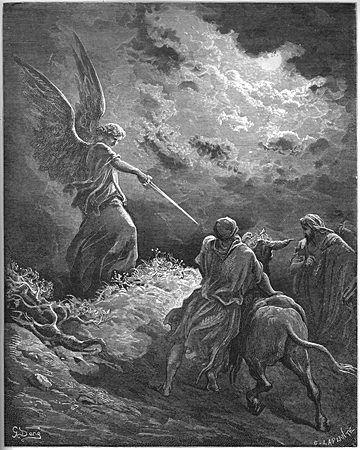2 pitaraḥ 2
1 aparaṁ pūrvvakāle yathā lokānāṁ madhye mithyābhaviṣyadvādina upātiṣṭhan tathā yuṣmākaṁ madhye'pi mithyāśikṣakā upasthāsyanti, te sveṣāṁ kretāraṁ prabhum anaṅgīkṛtya satvaraṁ vināśaṁ sveṣu varttayanti vināśakavaidharmmyaṁ guptaṁ yuṣmanmadhyam āneṣyanti|
But false prophets also arose among the people, as false teachers will also be among you, who will secretly bring in destructive heresies, denying even the Master who bought them, bringing on themselves swift destruction.
2 tato 'nekeṣu teṣāṁ vināśakamārgaṁ gateṣu tebhyaḥ satyamārgasya nindā sambhaviṣyati|
Many will follow their immoral ways, and as a result, the way of the truth will be maligned.
3 aparañca te lobhāt kāpaṭyavākyai ryuṣmatto lābhaṁ kariṣyante kintu teṣāṁ purātanadaṇḍājñā na vilambate teṣāṁ vināśaśca na nidrāti|
In covetousness they will exploit you with deceptive words: whose sentence now from of old does not linger, and their destruction is not asleep.
4 īśvaraḥ kṛtapāpān dūtān na kṣamitvā timiraśṛṅkhalaiḥ pātāle ruddhvā vicārārthaṁ samarpitavān| (Tartaroō g5020)
For if God did not spare angels when they sinned, but cast them down to the lower parts of hell, and committed them to chains of darkness, to be reserved for judgment; (Tartaroō g5020)
5 purātanaṁ saṁsāramapi na kṣamitvā taṁ duṣṭānāṁ saṁsāraṁ jalāplāvanena majjayitvā saptajanaiḥ sahitaṁ dharmmapracārakaṁ nohaṁ rakṣitavān|
and did not spare the ancient world, but preserved Noah with seven others, a preacher of righteousness, when he brought a flood on the world of the ungodly;
6 sidomam amorā cetināmake nagare bhaviṣyatāṁ duṣṭānāṁ dṛṣṭāntaṁ vidhāya bhasmīkṛtya vināśena daṇḍitavān;
and turning the cities of Sodom and Gomorrah into ashes, condemned them to destruction, having made them an example of what is going to happen to the ungodly;
7 kintu taiḥ kutsitavyabhicāribhi rduṣṭātmabhiḥ kliṣṭaṁ dhārmmikaṁ loṭaṁ rakṣitavān|
and delivered righteous Lot, who was very distressed by the lustful life of the wicked
8 sa dhārmmiko janasteṣāṁ madhye nivasan svīyadṛṣṭiśrotragocarebhyasteṣām adharmmācārebhyaḥ svakīyadhārmmikamanasi dine dine taptavān|
(for that righteous man dwelling among them, was tormented in his righteous soul from day to day with seeing and hearing lawless deeds):
9 prabhu rbhaktān parīkṣād uddharttuṁ vicāradinañca yāvad daṇḍyāmānān adhārmmikān roddhuṁ pārayati,
the Lord knows how to deliver the godly out of temptation and to keep the unrighteous under punishment for the day of judgment;
10 viśeṣato ye 'medhyābhilāṣāt śārīrikasukham anugacchanti kartṛtvapadāni cāvajānanti tāneva (roddhuṁ pārayati|) te duḥsāhasinaḥ pragalbhāśca|
but chiefly those who walk after the flesh in the lust of defilement, and despise authority. Daring, self-willed, they are not afraid to blaspheme the glories;
11 aparaṁ balagauravābhyāṁ śreṣṭhā divyadūtāḥ prabhoḥ sannidhau yeṣāṁ vaiparītyena nindāsūcakaṁ vicāraṁ na kurvvanti teṣām uccapadasthānāṁ nindanād ime na bhītāḥ|
whereas angels, though greater in might and power, do not bring a railing judgment against them before the Lord.
12 kintu ye buddhihīnāḥ prakṛtā jantavo dharttavyatāyai vināśyatāyai ca jāyante tatsadṛśā ime yanna budhyante tat nindantaḥ svakīyavināśyatayā vinaṁkṣyanti svīyādharmmasya phalaṁ prāpsyanti ca|
But these, as unreasoning creatures, born natural animals to be taken and destroyed, speaking evil in matters about which they are ignorant, will in their destroying surely be destroyed,
13 te divā prakṛṣṭabhojanaṁ sukhaṁ manyante nijachalaiḥ sukhabhoginaḥ santo yuṣmābhiḥ sārddhaṁ bhojanaṁ kurvvantaḥ kalaṅkino doṣiṇaśca bhavanti|
suffering the penalty as the wages of evil; people who count it pleasure to revel in the daytime, spots and blemishes, reveling in their deceit while they feast with you;
14 teṣāṁ locanāni paradārākāṅkṣīṇi pāpe cāśrāntāni te cañcalāni manāṁsi mohayanti lobhe tatparamanasaḥ santi ca|
having eyes full of adultery, and insatiable for sin, enticing unstable people, having a heart trained in greed. Children under a curse.
15 te śāpagrastā vaṁśāḥ saralamārgaṁ vihāya biyoraputrasya biliyamasya vipathena vrajanto bhrāntā abhavan| sa biliyamo 'pyadharmmāt prāpye pāritoṣike'prīyata,
Forsaking the right way they went astray, having followed the way of Balaam the son of Beor, who loved the wages of unrighteousness.
16 kintu nijāparādhād bhartsanām alabhata yato vacanaśaktihīnaṁ vāhanaṁ mānuṣikagiram uccāryya bhaviṣyadvādina unmattatām abādhata|
But he was rebuked for his own transgression; a donkey that could not talk spoke with a human voice and stopped the irrationality of the prophet.
17 ime nirjalāni prasravaṇāni pracaṇḍavāyunā cālitā meghāśca teṣāṁ kṛte nityasthāyī ghoratarāndhakāraḥ sañcito 'sti| (questioned)
These are wells without water, and mists driven by a storm; for whom the blackness of darkness has been reserved.
18 ye ca janā bhrāntyācārigaṇāt kṛcchreṇoddhṛtāstān ime 'parimitadarpakathā bhāṣamāṇāḥ śārīrikasukhābhilāṣaiḥ kāmakrīḍābhiśca mohayanti|
For, uttering great swelling words of emptiness, they entice in the lusts of the flesh, by licentiousness, those who actually escape from those who live in error;
19 tebhyaḥ svādhīnatāṁ pratijñāya svayaṁ vināśyatāyā dāsā bhavanti, yataḥ, yo yenaiva parājigye sa jātastasya kiṅkaraḥ|
promising them liberty, while they themselves are slaves of corruption; for a person is brought into bondage by whoever overcomes him.
20 trātuḥ prabho ryīśukhrīṣṭasya jñānena saṁsārasya malebhya uddhṛtā ye punasteṣu nimajjya parājīyante teṣāṁ prathamadaśātaḥ śeṣadaśā kutsitā bhavati|
For if, after they have escaped the defilement of the world through the knowledge of our Lord and Savior Jesus (the) Messiah, they are again entangled in it and overcome, the last state has become worse for them than the first.
21 teṣāṁ pakṣe dharmmapathasya jñānāprāpti rvaraṁ na ca nirddiṣṭāt pavitravidhimārgāt jñānaprāptānāṁ parāvarttanaṁ|
For it would be better for them not to have known the way of righteousness, than, after knowing it, to turn back from the holy commandment delivered to them.
22 kintu yeyaṁ satyā dṛṣṭāntakathā saiva teṣu phalitavatī, yathā, kukkuraḥ svīyavāntāya vyāvarttate punaḥ punaḥ| luṭhituṁ karddame tadvat kṣālitaścaiva śūkaraḥ||
It has happened to them according to the true proverb, "The dog turns to his own vomit again," and "the sow that has washed to wallowing in the mire."





















